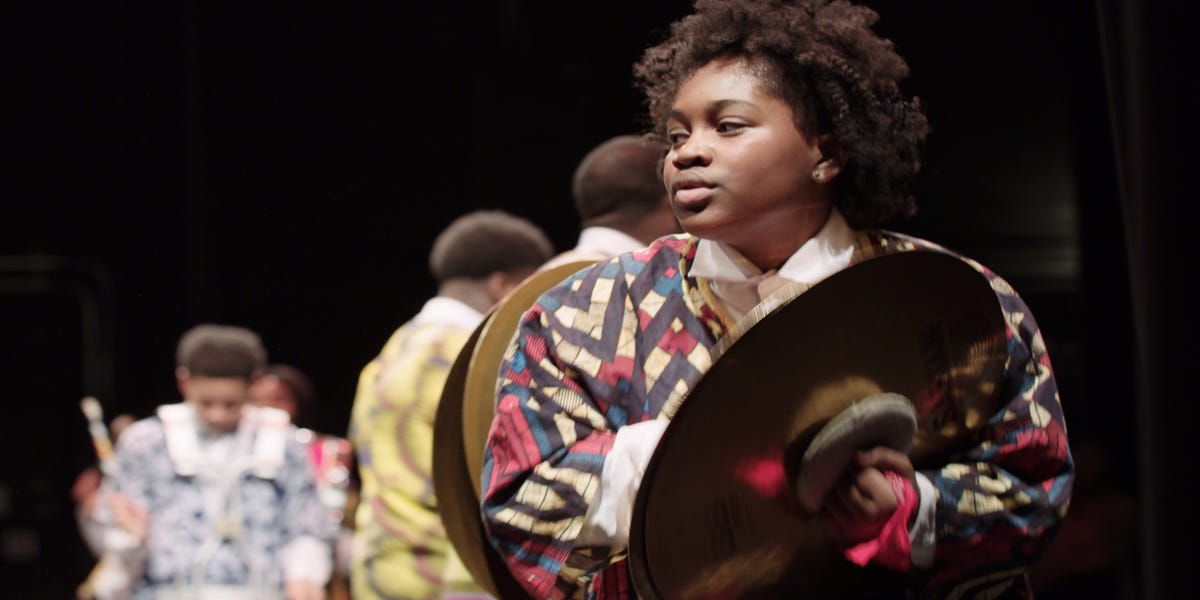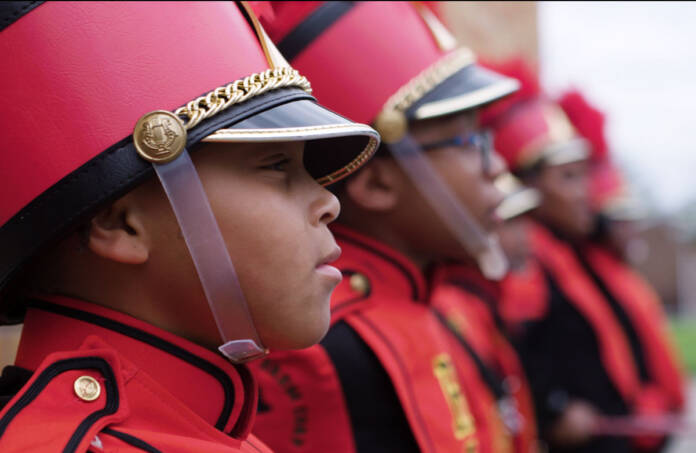River City Drumbeat (playing Fri/7-August 21 at Roxie Virtual Cinema) captures a Louisville, KY, phenomenon: the River City Drum Corp, a youth brigade of African American kids aged 5-18 who are taught not only about making music but also art, culture, leadership, and social skills. Lead by founder Ed “Nardie” White for nearly its first three decades, the corps’ baton passes to Albert Shumake, who spent his youth as part of the troupe, in a documentary that limns the storied drum corps in the midst of transition and its impact on the lives of children.
“It astounds me that music isn’t considered a core part of curriculum,” says San Francisco filmmaker Anne Flatté, who directed the film with Miami-based Marlon Johnson. “It’s such a powerful, positive force. There have been so many studies that have shown the benefits of art and music. I’ve seen over and over the positive impact it has on people.
“I think you see it in the film. The act of creating something is such a powerful thing for everybody. And making art and understanding art, seeing art, listening to music, it changes you inside and outside—it affects the world you’re in. You can see the positivity that comes out of that.”
Until 2010, White lead the River City Drum Corp in partnership with his wife, Zambia Nkrumah. When she died that year, he made a promise to her to stay in his position at least until the current middle-school cohort graduated high school. With that time fast approaching in 2017, White is ready to start a new chapter focusing on his art practice.
Shumake, with his history with the corps, is a natural successor to his mentor, but he has his own challenges to meet as he prepares to take over leadership, including caring for his seriously ill mother. The documentary also focuses on three members of the corps, two seniors in leadership roles, Jailen and Imani, a confident young woman who credits River City Drum Corp with helping her turn her life around, and Emily, a middle-schooler.
“With Emily, Mr. White would talk so much about middle school and how important middle school is in a child’s life, and how so many kids kind of get lost in middle school.” Flatté says. “We enjoyed hearing about Emily’s life and the idea what she would eventually step into the seniors’ shoes.”
One editorial decision that Flatté and Johnson made was to expand the scope of their film to encompass renowned Louisville sculptor Ed Hamilton, among whose works are the Amistad Memorial in New Haven, CT; “The Spirit of Freedom” in Washington, DC; and featured prominently in the documentary, Lincoln on the Waterfront, set along the Ohio River.
“This is American history,” says Flatté. “And yet it’s told through art. What was amazing about this whole approach is that Ed Hamilton is a huge mentor for the drum corps. Ed White would take the kids to his studio to show them, ‘Yes, you can be an artist.’ It was completely relevant to the story that we were telling about mentorship and all the care that goes into raising children.

“I remember Marlon and I talking about how we wanted to explore the legacy of the city’s history,” she adds. “We really felt strongly if we could do it by art, that would be ideal. That’s what lead us to Ed Hamilton.”
River City Drumbeat producer and San Francisco filmmaker Owsley Brown, who brought Flatté and Johnson together, is a Louisville native with strong ties to the city. Flatté edited Brown’s documentary, Music Makes a City, and went on to direct and produce the web series “Music Makes a City Now,” both about the Louisville Orchestra. Johnson, too, had worked on a film project with the Louisville Orchestra. But Flatté admits they are basically outsiders, learning about the drum corps and the city through their work.
“There’s a lot of power to making a film about a place that you are really familiar with, but there is also a perspective that comes when you are not from that city that can be useful in being able to really see and listen to what is going with fresh eyes. I think that came into play with this project for both me and Marlon.”
In the end, for the filmmakers, the experience of making River City Drumbeat was about more than getting to know the city and the young musicians and their teachers. Over the course of filming in the autumns of 2016 and 2017 with a final shoot in 2018, Flatté and Johnson were privileged with witnessing White’s last season with his young charges and a group of kids who have blossomed under his tutelage.
“When we met Mr. White and the drum corps, we were inspired and moved,” Flatté says. “Both Marlon and I are parents. We’ve seen the important effect on children of mentors with our own children. We know how important in our lives those people have been… We need to bring that out. There’s that feeling of, ‘You’ve gotta make it on your own.’ It’s not true. Nobody makes it on their own.”






